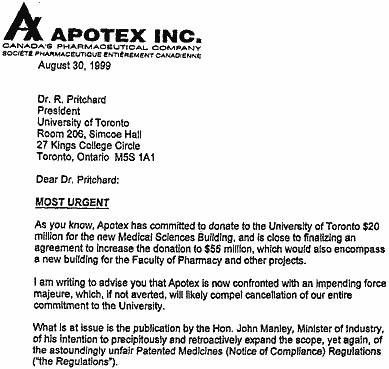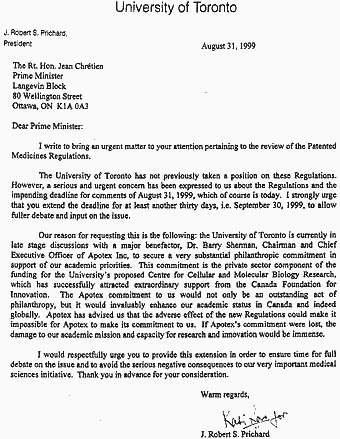 It isn't hard to understand the pressures on a University President (or Vice Chancellor) to do the wrong thing. Let's take the case of Nancy Olivieri at the University of Toronto. The University of Toronto didn't do the right thing for her. They didn't do the right thing for our patients who depend on integrity of the scientific process.
It isn't hard to understand the pressures on a University President (or Vice Chancellor) to do the wrong thing. Let's take the case of Nancy Olivieri at the University of Toronto. The University of Toronto didn't do the right thing for her. They didn't do the right thing for our patients who depend on integrity of the scientific process.This test has only one question. By giving an honest answer, you will discover where you stand morally. The test features a completely non-fictional situation in which you will have to make a decision. No one else will know, so you won't be fooling anyone but yourself if you give an untruthful answer. Remember that your answer needs to be honest, yet spontaneous.
Please read slowly and thoughtfully, giving due consideration to each line.
Here's the situation:
You are Robert Prichard, the President of a University. The University of Toronto to be specific. There is chaos all around you caused by the attempt by Dr Olivieri to publish what she has found in a drug trial involving a big commercial company. Apotex to be specific. One academic, Gideon Koren is sending anonymous threatening correspondence to several other academics. You are caught in the middle of all of this.
You receive a letter. You suddenly realize who it is from.
It's Dr Bernard C Sherman PhD P. Eng (CEO of Apotex Inc)!

It begins:
"As you know, Apotex has committed to donate to the University of Toronto $20 million for the new Medical Sciences Building, and Is close to finalizing an agreement to increase the donation to $55 million, which would also encompass a new building for the Faculty of Pharmacy and other projects. I am writing to advise you that Apotex is now confronted with an Impending force majeure, which, if not averted, will likely compel cancellation of our entire commitment to the University."
It ends with something that sounds like a command...
"We urge you to immediately contact the Prime Minister"

See full letter here. You receive it on 30 August 1999.
So here's the dilemma, and please give an honest answer. What would you do?
- write to the Prime Minister the next day (31 August 1999) urging him to urgently reconsider the new drug patent protection regulations or
- wait few days before urging the Prime Minister to do what is necessary.
Answers below the fold --

(Full letter PDF format)
Earlier|Later|Main Page
3 comments:
Aubrey, I'm on the edge of my seat. What happened in the end with this issue? So far in your story, it looks very bad for the U of T dean, who appears to have rapidly developed a convenient political viewpoint in response to the threat of the loss of a grant. Great post!
Warning: spoilers ahead. This was actually a case from the 1990s, one of the most important cases of suppression of research of that era. And it was unique in that a definitive investigation was later done, and a report published that exposed most of the tawdry goings on.
See the report by the Canadian Association of University Teachers:
http://www.caut.ca/en/issues/academicfreedom/olivierireport.asp
A clickable version of the above link
is at
CAUT
Thank you for discussing this.
Post a Comment